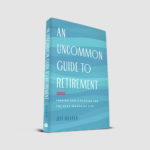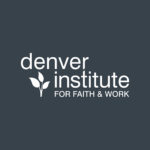Click below to listen to Episode 73 – Finding God’s Purpose During Retirement
Subscribe: Apple Podcasts | Google Podcasts | Spotify | Amazon Music | Stitcher | RSS | More
Finding God’s Purpose During Retirement
Tune in with Bob as he discusses retirement and finding God’s purpose during this transitional time. What is God’s desire for your life during retirement and are you open to being called to a higher mission? Joining Bob is John Haanen, the founder and CEO of the “Denver Institute for Faith & Work”, an educational nonprofit that teaches and convenes leaders on theology, work, calling, and culture.
Retirement is more than simply ceasing to work a typical 9-5 job. Just because you decide to retire does not mean that your purpose in life is now over, but many people go into a deep depression and time of confusion following this decision. However, there’s actually so much more that you can do now! Bob and John discuss 5 points when it comes to retirement:
- The culture of retirement
- Sabbath rest after retiring
- Finding your calling during retirement
- Re-engaging work during retirement for a purpose – a Christian worldview
- Stewardship during retirement
GUESTS: Jeff Haanen
HOSTED BY: Bob Barber, CWS®, CKA®
Mentioned In This Episode
Want to ask a question about your specific situation? Schedule a complimentary 15 minute phone call.
EPISODE TRANSCRIPT
[INTRODUCTION]
Welcome to “Christian Financial Perspectives”, where you’re invited to gain insight, wisdom and knowledge about how Christians integrate their faith, life and finances with a Biblical Worldview. Here’s your host Christian Investment Advisor, Financial Planner, and Coach Bob Barber.
[EPISODE]
Bob:
Numbers 8:23-26, “The Lord said to Moses, this applies to the Levites. Men 25 years old or more shall come to take part in the work at the tent of the meeting, but at the age of 50 they must retire from their regular service and work no longer. They may assist their brothers in performing their duties at the tent of the meeting, but they themselves must not do the work. This then is how you are to assign the responsibilities of the Levites.” So today, we’re going to be talking about retirement. It’s going to be a great subject. You’re really going to enjoy today’s podcast. We’re going to be looking at finding God’s purpose during retirement, and I have a special guest. It’s Jeff Haanen. Is that how you say your last name, Jeff? Is it Jeff Haanen?
Jeff:
Yeah. Close enough. Jeff Haanen.
Bob:
Haanen. Okay. Jeff Haanen. He’s the founder and CEO of the “Denver Institute for Faith and Work”, an educational nonprofit organization up in Denver, Colorado – one of my favorite places to go. Rachael and I love to go to Colorado every year and play in the summer especially. But his organization teaches leaders on theology and their work and their calling and culture. And he’s also founder of a fellowship called “5280”. I’m going to have him tell us what that is here in a minute – an emerging leader’s program in Denver, Colorado, and scatter.org and online learning platform. This is interesting. Jeff writes for “Christianity Today” also and “Comment Magazine” and other publications. So, this is how I found out about Jeff. He’s written this publication called an “Uncommon Guide to Retirement, Finding God’s Purpose for the Next Season of Life”, which is why I’m having him as a guest today on Christian Financial Perspectives. I found out about Jeff through Kingdom Advisors and you’ve heard me talk about that in the past. I’m a cCertified Kingdom Advisor, and when Mary Jo was doing the podcast with me, she is also a Certified Kingdom Advisor. Every month, they have a study group and they’ll have a guest speaker through video. And Jeff was a featured speaker a few months back where he spoke on this uncommon guide to retirement. And then Kingdom Advisors, they have a national conference every year, and I go to that conference every year in Orlando. It’s just a beautiful place. It’s a great time to get together with a bunch of incredible men and women of God that want to serve him in the financial services business. He was a speaker this year and I went to the presentation. You know, Jeff, you don’t know all this but you’re finding as I talk about it, and I was just really impressed by your presentations. So, welcome to Christian Financial Perspectives.
Jeff:
Thanks for having me, Bob. Glad to be here.
Bob:
Jeff, tell us about the Denver Institute for Faith and Work. That’s an interesting title.
Jeff:
Yeah, it’s kind of a mouthful, right? Yeah, kind of sounds highfalutin, but we’re really not. We’re a group of people mostly in Colorado here, though our network stretches throughout the U.S., And what we do, our mission is to inform men and women to serve God, neighbor, and society through their daily work. So, You may hear in that Jesus’ great commandment, “You shall love the Lord your God with all of your heart, all your soul, all your mind, all your strength, and love your neighbor as yourself.” We’re just an organization that believes our daily work is a way to love God, to serve our neighbors, and to demonstrate the gospel to an unbelieving world. And so as it relates to this topic today, we care a lot about themes of work and rest. I think retirement is actually one of those conversations around work and rest.
Bob:
Huh? See, that’s a different perspective. No one thinks about retirement as work and rest. I think they just think about it as rest. And I’m going to go pick up seashells on the seashore the rest of my life and play some golf. I mean, a lot of people think of it that way, but you’ve written this An Uncommon Guide to Retirement, Finding God’s Purpose for the Next Season of Life”. And you know, I’m excited in that I saw that you had five points of action, and this is about helping retirees find that purpose. You define these five points as culture, Sabbath, rest, calling, work, and stewardship. So for today’s podcast, I’d like to go through these five points, and tell us what you mean by these five points starting with that first one, the culture of retirement.
Jeff:
Yeah. So I think the culture of retirement is important to first pause and think about the water that we’re swimming in. And when we’re first going to think about what the Bible says about retirement, I actually thought before that, we need to think about what is our culture saying about this and what are some of the narratives that we’ve believed. So, you know, in the book I outline a few different common views toward retirement that are out there. And there’s really three big ones that I go over and one is “let’s vacation”. This idea of retirement, as you said, is a never ending vacation really marketed to us from post World War II America and the first retirement community went in and Del Webb, Sun City, and Arizona. But this has been a pretty widespread narrative about what retirement is. It’s about never-ending vacation and you should have kind of the best life, you know, that you can have now. And I think there’s some reason that we need to first pause and think, is that really what we’re looking for? The second big thing on this part, on the culture side, is how some, I think Christians, have responded as never ever retire. Yet you even read that interesting Bible verse at the beginning of this podcast. It does seem to think that there is and the Bible hints that retirement isn’t necessarily biblical, but the way that our work and our calling should change over time as we age ought to change. And I think this idea of never retire – well the stats don’t bear it out – people are still retiring in droves, but a lot of people are tired. They actually need rest. They need rejuvenation to figure out what is next in life. And then kind of this third idea in culture, I think there’s another movement in our culture toward what we’re calling “Encore Careers”. And these can be really wonderful opportunities to serve and give back to your community in retirement. But in that, I also want to ask what is really motivating us to reengage your community? What is really going on inside the heart? And that’s one of the big, I think, contributions that Christians can make to this conversation is not only what we’re doing later in life, but why are we doing it?
Bob:
You know, when I went through that scripture, by the way, that’s the only place in the Bible that retire appears, that I know of. I’ve never seen it anywhere else. And you know, I study the Bible and the word daily, but it says at the age of 50 they retire and may work no longer, but they’re going to assist their brothers in performing their duties. So really, there is a purpose. It doesn’t say at the age of 50 they’re going on vacation, but it says they’re assisting their brothers in performing the duties at the tent of the meeting. So, there is definitely a purpose, isn’t there?
Jeff:
Yeah, I think that’s really important that you picked up on that. So, the idea of hauling around the furniture of the tabernacle, it was heavy work. It was difficult work. This was better left to the 20 year olds and 25 year olds, you know, in ancient Israel. And so the idea of at 50 of not hauling around the heavy furniture of the tabernacle makes sense, but they’re still there to assist their brothers in the tent of the meeting. Or some version of the Bible say to minister to them. And I think the real secret that people aren’t thinking about much when they think about retirement necessarily in the Bible, but I think the real secret is this concept of being an elder. And an elder in the Old Testament was a person of wisdom, of blessing, usually like city influence on leadership. Usually, they were a person that had a lot to give from a whole lifetime of accumulated wisdom. So this concept of elders, not only you know what you do like a small group in a church setting, but the Old Testament foundations of that, were people that were leading Israel, the elders of Israel. So as we think about that and I think about what is that image, you know, I think even in our culture today, the word elderly is an insult, you know, it communicates frailty or weakness. But I think we really need to recover this idea of elder to think of Cicero in the Senate at age 80. Like that really is the question that is before us. Is it retreating from culture or is it not necessarily doing the heavy lifting of a young person, but still ministering, blessing, providing wisdom that a culture desperately needs.
Bob:
I’ve got some gray hair now myself, Jeff. I’ll be 58 in June, and I’ve made a lot of mistakes and I think those mistakes have taught me wisdom and following God’s Word. And you know, I love Proverbs because it speaks of wisdom throughout every chapter. Every verse is about wisdom, and it’s so exciting to hear somebody say this today. Hey, just because you’re retired, that doesn’t mean you’re out of the game because you can help so many people by being a mentor to them.
Jeff:
Yeah. And that’s a good word and that’s interesting that you mentioned the wisdom that you have accumulated through mistakes. We work with a lot of millennials in our organization. As I think about the real robust relationships that have developed between either the boomers or the older Xers and then some of the millennials or even gen Z that I know, it really looks a lot like friendship and really looks like vulnerability of sharing the things that have gone well and that really haven’t gone well, and sort of mutual sharing that really does pass on wisdom from one generation to another. It is also humble enough to listen to the next generation to hear what they think and what they feel. I really think that idea of mentoring as intergenerational friendship can be really, really powerful. And it’s kind of a challenge, also. I would say to your listeners and those listening today, who can I develop a real friendship with that might be 30 years younger, right? What would that look like?
Bob:
And I’ll tell you what, they’re begging for it. Because as I got older, I was thinking, well, the millennials are not going to want me as their financial advisor. They’re going to want somebody younger. And I am finding the opposite, Jeff. I’m finding they love the wisdom and insight because they know I’ve been through it.
Jeff:
Yeah, absolutely. And especially during turbulent economic times that we’re in. We need people that have weathered some of these and that and say, okay, I’ve been the captain on this ship a long time. I’ve been through many storms. So, whether that’d be about finances or about life wisdom in general, you’re right. Intergenerationally, we need each other.
Bob:
That’s a good point. You want a captain of a ship when the seas get really rough, you want somebody who has experience with those seas. So, the second point you have is about a Sabbath rest after retiring. And when I heard you talk about this at the conference and also in our study group, I have never thought about this. So, what do you mean by a Sabbath rest after retiring?
Jeff:
Well, here’s the big idea of the book. Really, I think the right category for retirement is not vacation, it’s Sabbath. I think it’s rest. I think a lot of people when they move can be in their early sixties, mid sixties, late sixties, or whenever they retire. I think they need time to rest, to rejuvenate, to listen to God’s voice and to sort of reflect on where they’ve been before they go into that next step. This idea of not only a day of Sabbath rest, but a season of Sabbath rest comes from Leviticus 25 where God commanded the Israelites to let the land rest for one year out of every seven. It’s kind of an interesting ratio there. If you were to rest for one year out of every seven, what would this look like? Would you have, sort of, you know, mojo to keep on going for a very long time. I think that resting for one year our of every seven is pretty unrealistic for most people in their careers, and they need to work regularly. But I think that when most people enter retirement, rather than thinking of, I’m going to go go wild on the vacation thing. Okay, take a vacation. Those are all good. Those are all fine, but let’s figure out what it looks like to recenter our identity and who God says we are, not our work; to trust God to provide for us. I think that’s a critical part of Sabbath rest. Really an important part of Sabbath is also this idea of justice, that the command of Sabbath says not only you should rest, but all of the all the servants, even the animals in your household should rest. So, those are the least cultural power. The Sabbath is meant to restore communities as well. And when we don’t rest, actually, a lot of injustice and idolatry moves for our society as well. So it has personal, individual kind of connotations as well as public. But the idea is when you move into retirement, would you think about taking a season of three or six or nine months of deep Sabbath rest to listen to God’s voice? That’s the main idea.
Bob:
And we’re so familiar with that word as believers in Christ of a sabbatical and telling our pastor, “Hey, you need to go take a sabbatical.”
Jeff:
We all do. We all need one.
Bob:
We all need that. You’re right. And that’s what brings us to our third point that finding your calling during retirement. I love the calling questions that you posed and looking at that, what is my calling? What does God have me do now?
Jeff:
Yeah. So in the book we talked a little bit about calling and I’m trying to save the idea from, this is something that 20 year olds getting out of college talk about. Now, that is something hopefully 20 year olds are getting out of college to talk about. But it’s a much bigger idea. The idea of calling comes from a Latin root ‘vocation’ or this idea of listening to God’s voice over a period all over your whole life. And so calling is really about responding to God’s voice. In the Bible, the highest calling is to love the Lord your God with all of your heart, mind, soul, and strength and to love your neighbor as yourself. So, on that is not things about like my ideal job or the right kind of perfect mix between grandkids and part-time fulfilling work. Really, it’s about humbling yourself before God. Really, that’s the first part about calling. And when we can do that, and really listen to God’s voice, it sort of opens up where he leads. So if he says, go back to work full time, or if he says, “Don’t. I want you to be off right now and spend time with a friend who has cancer,” or if it’s working part time or if it’s being present to your spouse for a season, assuming you financially have some of that flexibility, we really want to use that Sabbath rest to start to tune the ear to God’s voice and start asking some of those big questions maybe that you haven’t had a time in a career to ask. Questions like, you know what? I see God in the world. Where do I feel drawn to that, right? Or even some of the harder questions of what am I really afraid of? What I really fear? What have I been running from for all of this life? So, this is a real dynamic conversation between our actions, but also our motivations. God is not only wanting to heal the world, which he does, he also wants to heal our hearts.
Bob:
Amen. Amen. So, the fourth point that you have is re-engaging possibly back into work during retirement for that purpose that you’re finding from having the Sabbath’s rest, and finding that calling. It just seems that I can see how each one of these points points to the next point.
Jeff:
Yeah. So on the work side, you know, You think green gauging work in the season of retirement, those are oxymorons, right? Retirement is not work. I’m not going to do that. But the reality is, especially in the last decade or so, more and more people have been thinking about what would it look like for me to work either part time or even more in retirement. And I think, you know, again in our culture it’s really seen almost like you’ve failed if you’re working later in life. Like, did you not save up enough money? What’s wrong with you? But in the biblical narrative, work is good. God works for six days, rests for one. To work is to be human. And again, as we talked about with this idea of being an elder, I think it changes over time. God doesn’t necessarily expect you to do the same thing you’re doing when you’re in your thirties, but work is about service. Work is about contribution, committed contribution to the needs of others. Whether that’s, you know, serving somebody a bagel at a local bagel shop or whether it’s volunteering at Thrivent or whatever it might be. I think that work, rather than own this sort of the neverending possibilities of what we might do volunteer wise, but really saying what now that I’ve rested and I’m listening to God’s voice, what will I really commit myself to, to whose benefit will I love and serve? Because again, the big picture is still the big picture. It’s still about loving God and loving our neighbor. And if work is an aspect of loving our neighbor, we should rethink, could I in a work context, even amidst the difficulties and the challenges that are there, could I serve well? If so, let’s look for God’s voice in that.
Bob:
Also, I think about work and retire. We were both talking about those two things today. And retire appears in the Bible one time, but work appears over 500 times. And as men when we congregate, and now when women do the same thing, but I know it’s always kinda been a man thing. Like, “Hey, what do you do, bro?” Okay, when you say what do you do, you’re usually asking that where do you work? A man will normally answer back that way. Now, I know many times women are more relational, a lot more relational than men, and they’ll know about each other’s children and all the social things there. But work is such a part of what we do. It defines a purpose, and when we retire and we’re no longer working, it’s great in the beginning, but after months and months and months of this, you know, I hear depression starts to come about in many of these retirement communities. Have you heard that too?
Jeff:
Yeah. It’s a real issue. And you did say something interesting. Women tend to be better at retirement than men. Usually, they’ve had more of a dynamic relationship between family and community and work in their life. Not all the time, but men usually have been working full time for a very long time. And so when retirement comes, it feels like jumping off a moving train. You gets skids all over your face. People aren’t really used to figuring out what this kind of life looks like. So, I think one of the big questions that I ask men is really around identity. Who are you? Because it’s a painful process to lay down that identity of when everybody was calling you. You’re needed and to say, I’m going to let go of that so I can take up, what God is calling me to in this next season. So it is challenging. Work, and I talked about this in the book, should not be the source of our identity, but an expression of our identity.
Bob:
Hey, I like that.
Jeff:
Yeah. The source of out identity is we are beloved. We are loved by God, his daughters and his sons. This is the source. This is the fountain of our identity, but that can be expressed in many different contexts, including work contexts.
Bob:
I was writing that down – source – it should not be a source or it should be a source?
Jeff:
Let’s see. Our work is not the source of our identity. It’s an expression of our identity.
Bob:
It’s an expression of our.
Jeff:
Our identity is who God calls us. We are his. Like that is the very source of our identity. But it expresses who we are in very unique ways. Whether you’re a craftsmen or whether you’re a nurse or whatever it might be, just know, you’re good at this. This is something that really God has given to you for the sake of your neighbor and it can be a good expression of your identity for the wellbeing of others. So really, this is what I was talking about earlier. We need to heal some of those motivations as we enter back into this idea of what would it look like for me to work in my sixties or even my seventies.
Bob:
So I can’t believe we’re already at the fifth point now, and that’s about stewardship during retirement. What do you mean by stewardship during retirement? But I do see how that would be the point number five. I guess it’s putting all this together.
Jeff:
Yeah. So here is one idea for stewardship. Oftentimes, we talk about that in terms of money, which we should because there’s a lot in the Bible about God owning everything, right? Including money and the cattle on a thousand hills, right?
Bob:
Right.
Jeff:
God owns us. He has bought with his blood at a price. You know, we remember this in Lent and at Easter. And so as we think about stewardship, we have to think about what does God entrusted to us for the wellbeing of others. And that again, maybe money, but it could be skills. It could be networks, right? It could be ideas, it could be wisdom. We really have to think, if you’re listening to this, and you know, I have this thing in my hand that I feel like I have to give to somebody else that’s a stewardship longing, right? Again, I get that might be money, you know. But that could be, I’m going to take my grandkids on this weekend. I always thought, because I want to share that one time of pain and restoration that I think could be a blessing to my kids as they think about marriage relationship one day, for example. So stewardship is the big category of everything that God has given to us as a gift that we’re called to steward on behalf of others.
Bob:
Amen. Well, Jeff, that’s the five points that we’ve already gone through. I can’t believe it. It went fast. It really went fast. But I wanted to leave our listeners with four thought provoking questions before we’re done today talking about what’s God’s purpose for your life during retirement. So, think about that first one. It’s the title of today. What is God’s purpose for your life during retirement? Maybe you’re not retired yet. So, this question is for those that are retired and those that are about to retire. And the second one is, are you open to God calling you to a higher purpose during retirement during that time? The third one is, have you thought about how to incorporate a Sabbath rest into your retirement to seek God’s will? Maybe you’ve been retired for several years, but you’ve really never taken what we call a Sabbath rest, a sabbatical, just to seek God’s will. God, what would you have me do going forward? And then the fourth question is a challenging question. Will you commit to a time in the next 30 days to contemplate these calling questions for your own journey? Jeff, any last comments that you would like to share before we’re done with today’s podcast?
Jeff:
Yeah, I think the last thing I would say is to leave us with a Bible verse and an image of what I think of beautiful, fruitful life looks like. It’s from Psalm 92 and it says, “The righteous flourish like the palm tree and grow like a cedar in Lebanon. They are planted in the house of the Lord. They flourish in the courts of our God. They still bear fruit in old age. They are ever full of sap and green.” I think that is a beautiful vision as I think about, of course of my life, to my last day, I desire to bear fruit and to ever be full of sap and green.
Bob:
Amen. Amen. That is a beautiful scripture. We’ll end on that. I do want to say this to all of you that are listening to the podcast. If you would like to see these questions written down, we always post these on our website. It’s Christianfinancialpodcast.com. You’ll see all those questions there, and I want to help you find your purpose and if you want to talk to another brother in the Lord, I want to come beside you and pray with you and help you find that purpose because retirement can be such wonderful years of helping others and being there for your grandkids if you have grandkids. That can be the most wonderful time of your entire life. I don’t want you entering into a depressive state, but I want you to enter into a state of victory in Christ Jesus. Amen, brother.
Jeff:
Amen. Thanks for having me.
[CONCLUSION]
That’s all for now. We invite you to listen to all of our past episodes covering many financial topics from a Christian Perspective. To make sure you don’t miss any of Bob’s upcoming episodes you can subscribe to Christian Financial Perspectives on iTunes, Google Play Music, Spotify, or Stitcher. To learn more about integrating your faith with your finances, visit ciswealth.com or call 830-609-6986.
[DISCLOSURES]
Comments from today’s show are for informational purposes only and not to be considered investment advice or recommendations to buy or sell any company that may have been mentioned or discussed. The opinions expressed are solely those of the host, Bob Barber and his guests. Bob does not provide tax advice and encourages you to seek guidance from a tax professional. Investment advisory services offered through Christian Investment Advisors Inc. DBA Christian Financial Advisors, a registered investment advisor.














